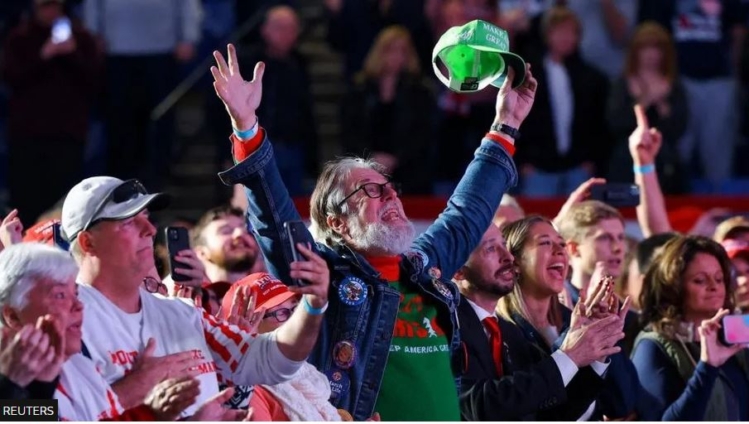Trump’s legal defeat in Colorado may turn into political gold
The Colorado Supreme Court's ruling to disqualify the former president from the Republican Party's upcoming primary ballot is yet another unprecedented moment in US politics.

One of the court challenges to Donald Trump's eligibility to run for president in 2024 has finally struck gold.
The Colorado Supreme Court's ruling to disqualify the former president from the Republican Party's upcoming primary ballot is yet another unprecedented moment in US politics.
It's a decision that further blurs the lines between America's political and judicial systems, setting up a fresh collision between the election campaign and the courts.
However, this latest legal setback is unlikely to seriously damage Mr Trump's bid to return to the White House - and he is already using it to his political advantage.
The activists who brought the case in Colorado - a liberal watchdog group and collection of anti-Trump Republican and independent voters - may be celebrating their victory.
But the response so far by Democratic politicians - the ones who will stand before voters next year and are working to defeat Mr Trump at the ballot box - tells a different story.
This isn't a fight they want.
Colorado Secretary of State Jena Griswold - who had declined to act unilaterally to block Mr Trump from the state's primary - issued a response to the court's decision on Wednesday that didn't exactly drip with enthusiasm.
"This decision may be appealed," she said. "I will follow the court decision that is in place at the time of ballot certification."
Part of the reason for her seeming reluctance to weigh in - and the relative silence of other Democrats - is that the ultimate outlook for the Colorado challenge isn't bright.
Mr Trump's campaign is already promising to appeal the decision - directly to the US Supreme Court. According to Samuel Issacharoff, a professor of constitutional law at New York University, the appeal will almost certainly be granted, particularly given that other state courts have considered, and rejected, similar lawsuits.
"It cannot be that the national candidacy for presidency is determined on a state by state basis," he said. "That would be a breakdown of the democratic order."
The Supreme Court currently has a six-to-three conservative majority. And while the justices, even the three appointed by Mr Trump, have shown a willingness to rule against the former president in previous cases, Mr Issacharoff believed they would be extremely reluctant to be seen as limiting voters' options at the ballot box.
Democrats may also be concerned that the legal challenges - and the Colorado ruling - plays into one of the central messages of Mr Trump's campaign, that the ruling elite is threatened by his political movement and are willing to subvert the will of the people to keep him from power.
Trump Campaign Spokesman Steven Cheung called the Colorado ruling "completely flawed". He said it was a sign that Democrats had lost faith in President Joe Biden and "are now doing everything they can to stop the American voters from throwing them out of office next November".
Meanwhile, Mr Trump's Republican rivals are largely rallying around him, as they have during all of the former president's legal battles this year.
Florida Governor Ron DeSantis called the Colorado decision an abuse of power. Vivek Ramaswamy said he would remove his own name from the state's primary ballot. The Republican Party of Colorado has threatened to cancel the primary entirely and pick their choice for a nominee through a caucus process.
"We're going to win this the right way," said former South Carolina Governor Nikki Haley, who may be Mr Trump's closest challenger. "The last thing we want is judges telling us who can and can't be on the ballot."
Democrats may be frustrated that, at least so far, Mr Trump seems to have avoided any price - political or legal - for the role he played in the 6 January 2021 attack on the US Capitol.
The former president has been indicted on charges related to his attempts to overturn the 2020 election twice - by federal prosecutors and by a district attorney in Georgia. But those trials, which will be decided by citizen juries and not judges, are still months away, if not longer. And it may be telling that special counsel Jack Smith, who is heading the federal case, has brought narrow charges that don't rely on directly proving that Mr Trump led an insurrection.
The decision by the Colorado Supreme Court may have offered a dramatic moment of accountability that some Trump critics are craving, but it also is likely to be a temporary one. And, in the end, it may make it more likely the former president returns to power, not less.


